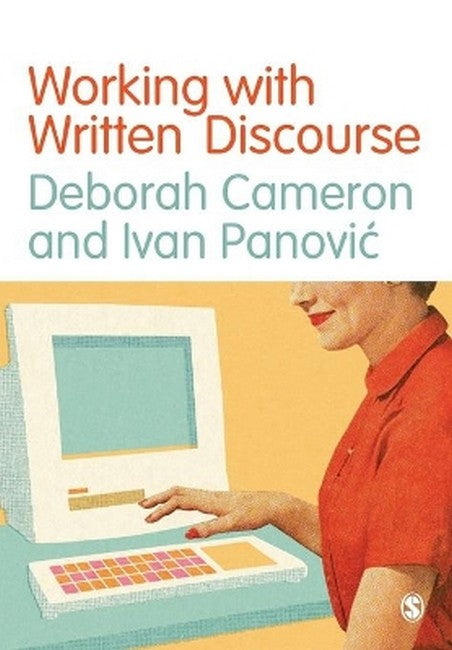Deborah Cameron teaches at Oxford University, where she is Professor of Language and Communication. Her main research interests are in sociolinguistics, discourse analysis and the study of gender and sexuality; her previous publications include Working with Spoken Discourse (2001) and Working with Written Discourse (with Ivan Panovic, 2014), Good to Talk? (2000),The Myth of Mars and Venus (2007), and Verbal Hygiene (1995/2012). Ivan Panovic received his doctorate from Oxford University, where he went on to spend two years as a postdoctoral research fellow in Arabic sociolinguistics. He is now Assistant Professor of sociolinguistics at Nanyang Technological University in Singapore. His book Literacies in Contemporary Egypt will be published in 2014.
Request Academic Copy
Please copy the ISBN for submitting review copy form
Description
Introduction Preliminaries Discourse and Discourse Analysis Speech and Writing: The Debate on Difference Writing, Technologies and Media Scripts and Spelling Approaches Approaches to Written Discourse: An Initial Orientation Critical Discourse Analysis Corpus-Based Discourse Analysis Multimodal Discourse Analysis Computer-Mediated Discourse Analysis Multilingual Discourse Analysis Applications Working with Written Discourse in Social Research Designing Your Own Projects
Working with Written Discourse in three words: erudite, elegant, engaging. Grounded in an extensive, up-to-date literature, Cameron and Panovic provide here a beautifully and sensibly organized introduction to the field. With constant opportunities for further reflection and discussion, the book is also chock-a-block with contemporary examples and fresh ideas for hands-on practice. I would - no, I will - use this book as a core text in my graduate seminars as readily as I will my undergraduate courses. Cameron's Working with Spoken Discourse has been a key text in my classes for over a decade; my only (quite unreasonable) gripe being that it didn't offer me enough on things like new media discourse and multimodal discourse. Well, here we have it: a perfect complement. And much more besides. -- Professor Crispin Thurlow This volume is written in an admirably clear and understandable style, without compromising on the depth of the arguments and discussions. It is comprehensive and up-to-the-minute in its discussion of areas like multimodality and the new media, without overlooking 'older' media and more conventional writing. I will recommend it highly to students at all levels. -- Dr Mark Sebba This is an outstanding introduction to discourse analysis of written language in an age that is more and more characterized by multilingual, digital, and generically hybrid texts. In an accessible style, Working with Written Discourse illustrates how these texts can be analyzed employing a wide variety of approaches that are critical, multidisciplinary, and productive. -- Professor Jaffer Sheyholislami Working with Written Discourse is an engaging read on current theoretical and methodological approaches to the analysis of written discourse. The book enjoys a number of distinctive features compared to parallel publications. First... this book provides a thorough introduction to common underpinning concepts and current literature on written discourse and its analysis. Second, it presents an interesting array of examples, activities and further readings to initiate the reader to a hands-on experience in written discourse analysis. Third, looking beyond conventional textual and formalistic aspects of written discourse, it highlights the role of socio-political and cultural variables and contexts in shaping and transforming written discourse as well as its analysis. Most importantly, it is one of the pro-technology publications on written discourse analysis ,as a big portion of it is dedicated to technology-mediated discourse and technology facilitated discourse analysis. The image on the front cover is a subtle gesture in this respect. -- Pejman Habibie, Faculty of Education, The University of Western Ontario, Cananda

